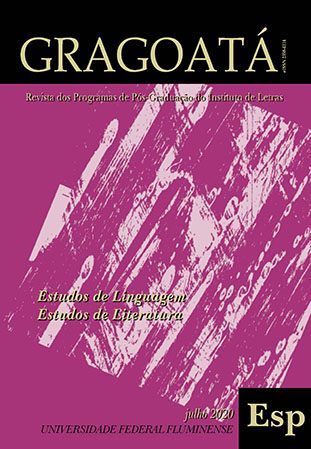The negotiation in the feigned orality: a study on the forms of address in the representation of the Spanish Golden Age
DOI:
https://doi.org/10.22409/gragoata.v25iEsp.34203Keywords:
forms of address, feigned orality, social negotiation, translation.Abstract
In this paper we conduct a qualitative analysis of the forms of address in the feigned orality found in the audiovisual sample Alatriste (2006). The Spanish and Portuguese audio of the movie belongs to the set of samples studied by the project CEEMO – estudios en Corpus del Español Escrito con Marcas de Oralidad. Based on the perspective that language dynamics and social dynamics are two linked phenomena, our analysis of the Spanish source text and its Portuguese translation is based on the feigned orality (SINNER, 2011a; 2011b), on the theoretical debates about the social dimension of power and solidarity (BROWN; GILMAN, 2003 [1960]), and on the socio-historical phenomenon of the forms and pronouns of address (BIDERMAN, 1972-1973; FARACO, 2017 [1996]; KING, 2011). The results of our research, which are related to three main research questions, lead us to interpret the translation text as a type of linguistic renewal.
---
Original in Spanish.
Downloads
Downloads
Published
How to Cite
Issue
Section
License
Authors who publish in Gragoatá agree to the following terms:
The authors retain the rights and give the journal the right to the first publication, simultaneously subject to a Creative Commons license CC-BY-NC 4.0, which allows sharing by third parties with due mention to the author and the first publication by Gragoatá.
Authors may enter into additional and separate contractual arrangements for the non-exclusive distribution of the published version of the work (for example, posting it in an institutional repository or publishing it in a book), with recognition of its initial publication in Gragoatá.

Gragoatá is licensed under a Creative Commons - Attribution-NonCommercial 4.0 International.











